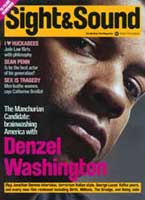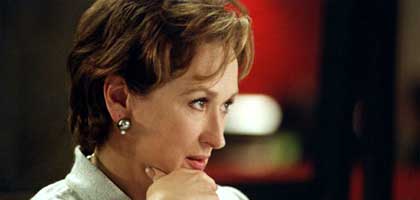
The Manchurian Candidate
USA 2004

Reviewed by Stephen Dalton
Synopsis
Our synopses give away the plot in full, including surprise twists.
Kuwait, 1991. Seized in a nocturnal ambush during the Gulf War, the platoon led by Major Bennett Marco (Denzel Washington) and Sergeant Raymond Shaw (Liev Schreiber) are taken to a secret island laboratory. There they are brainwashed and implanted with mind-control chips by the sinister Manchurian Global corporation. False memories of Shaw's bravery are implanted and Shaw returns to America a decorated hero.
Washington, the present. Shaw secures a vice-presidential nomination after bullying intervention by his mother, Senator Eleanor Prentiss Shaw (Meryl Streep), who is in uneasy alliance with Manchurian Global. Marco and his surviving platoon members suffer nightmare flashbacks challenging Shaw's heroism. In a violent confrontation with Shaw, Marco uncovers a microchip implanted in the candidate's back. Expert Richard Delp (Bruno Ganz) examines it and, via electroshock therapy, helps Marco recall what really happened in Kuwait.
Marco's superiors are sceptical but FBI agent Rosie (Kimberly Elise) becomes his confidante. The brainwashed Shaw responds to subconscious triggers from Manchurian Global and murders several people who threaten his political ambitions. In New York, Marco and Rosie try to reason with him. Eleanor Prentiss Shaw, the mastermind of the plot, uses subconscious triggers to control Marco, ordering him to attend her party's Election Day rally. Marco is programmed to kill the new president-elect, leaving Shaw free to rule America alone. But Shaw, battling against his brainwashing, makes sure both he and his mother are slain by Marco's bullet, averting a corporate coup d'état.
Review
Defying the recent trend for mediocre remakes of much-loved movie classics, from The Ladykillers to The Stepford Wives to Alfie, Jonathan Demme's re-imagining of the mother of all conspiracy thrillers is a strong and substantial work. Based on Richard Condon's pulpy 1959 novel, John Frankenheimer's TheManchurian Candidate (1962) was a noirish Cold War satire on McCarthyism. Starring Frank Sinatra, Laurence Harvey and Angela Lansbury, it appeared to predict the assassination of John F. Kennedy. Steeped in historical import and movie folklore, Frankenheimer's monochrome masterpiece would seem impossible to top and foolish to remake. This new version, however, feels not just refreshingly vital but uncannily topical.
By updating the dramatic context from the Korean war to the first Gulf War and making the villains shadowy corporations instead of communist plotters, Demme's remake - centred around the suspicions of Major Marco (Denzel Washington) about his former comrade turned vice-presidential candidate Raymond Shaw (Liev Schreiber) - taps into current events from Baghdad to the White House. Given the notoriously slow gestation of studio projects, such timely parallels can only be coincidental. And yet Daniel Pyne and Dean Georgaris's ambitious screenplay - featuring stolen elections, inflated war records and talk of "regime change" and "civilian contractors" - feels less like what-if speculation than real-time social commentary. Although primarily a piece of entertainment, The Manchurian Candidate makes a fine sister film to Michael Moore's Fahrenheit 9/11. (Both, it could be argued, blur fact into fiction.)
Washington gives a pleasingly contained performance, internalising much of Marco's turmoil. Meryl Streep is terrific as Shaw's mother, Lady Macbeth in shoulder pads, never stooping to pantomime caricature. Holding his own admirably, Schreiber is even more zombie-like and impassive than Harvey in the original, an obsessively neat and asexual puppet manipulated by forces beyond his understanding. The Oedipal subplot between Shaw and his mother - overtly incestuous in Condon's book and distilled into a shocking full-mouth kiss by Frankenheimer - here becomes a suggestive bathroom flirtation; their lips loom close but never meet.
Demme includes some visual allusions to Frankenheimer's picture (including playing card and botanical hothouse motifs) but stylistically his remake belongs to a post-MTV age of jump cuts and soundbites - occasionally trite, but mostly effective. The flashbacks to the Kuwait brainwashing are full of mysterious voodoo figures and jarring violence, recalling Adrian Lyne's thematically similar post-Vietnam thriller Jacob's Ladder (1990). Slow zooms and straight-to-camera head shots are repeatedly employed to build emotional intensity and an all-engulfing, Spielbergian white light bleaches out the screen whenever Marco's or Shaw's brainwashed selves are triggered. A set-piece murder is framed in poetic morning mist and striking underwater POV shots.
Demme has also made a more literal-minded film than Frankenheimer, tying up some of the original's teasing loose ends and allegorical layers. While the 1962 version offered the vertiginous sense of conspiracies within conspiracies, with communist and fascist moles reflecting one another like a macabre hall of mirrors, the 2004 version pins the blame squarely on an Enron-style conglomerate. Likewise Janet Leigh's original Rosie, stalking Marco for no clear reason, seemed to be following her own cryptic agenda but Kimberly Elise's character is neatly categorised as an FBI agent. In the original, Shaw botched the presidential assassination and instead killed his own McCarthy-like stepfather; here, Marco pulls the trigger while Shaw sacrifices himself and his mother, an inspired twist but a more conventional act of Hollywood justice. There are both losses and gains here. But The Manchurian Candidate is an intelligent, provocative blockbuster that succeeds on its own merits.
Credits
- Producers
- Tina Sinatra
- Scott Rudin
- Jonathan Demme
- Ilona Herzberg
- Director
- Jonathan Demme
- Screenplay
- Daniel Pyne
- Dean Georgaris
- Based upon the film screenplay by George Axelrod
- Based upon a novel by Richard Condon
- Director of Photography
- Tak Fujimoto
- Edited by
- Carol Littleton
- Craig McKay
- Production Designer
- Kristi Zea
- Music
- Rachel Portman
